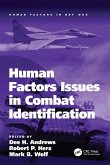Human Factors Issues in Combat Identification (eBook, PDF)
Redaktion: Herz, Robert; Wolf, Mark; Andrews, Dee
61,95 €
61,95 €
inkl. MwSt.
Sofort per Download lieferbar

31 °P sammeln
61,95 €
Als Download kaufen

61,95 €
inkl. MwSt.
Sofort per Download lieferbar

31 °P sammeln
Jetzt verschenken
Alle Infos zum eBook verschenken
61,95 €
inkl. MwSt.
Sofort per Download lieferbar
Alle Infos zum eBook verschenken

31 °P sammeln
Human Factors Issues in Combat Identification (eBook, PDF)
Redaktion: Herz, Robert; Wolf, Mark; Andrews, Dee
- Format: PDF
- Merkliste
- Auf die Merkliste
- Bewerten Bewerten
- Teilen
- Produkt teilen
- Produkterinnerung
- Produkterinnerung

Bitte loggen Sie sich zunächst in Ihr Kundenkonto ein oder registrieren Sie sich bei
bücher.de, um das eBook-Abo tolino select nutzen zu können.
Hier können Sie sich einloggen
Hier können Sie sich einloggen
Sie sind bereits eingeloggt. Klicken Sie auf 2. tolino select Abo, um fortzufahren.

Bitte loggen Sie sich zunächst in Ihr Kundenkonto ein oder registrieren Sie sich bei bücher.de, um das eBook-Abo tolino select nutzen zu können.
This book presents approaches on how human factors theory and research addresses the challenges associated with combat identification, with emphasis on reducing human error that leads to fratricide. To reduce fratricide, it is important to apply human factors principles to the advances in technological approaches that enhance combat identification. The book brings together authors from academic and military researchers to government contractors and commercial developers in a single volume with broad appeal.
- Geräte: PC
- ohne Kopierschutz
- eBook Hilfe
- Größe: 7.98MB
Andere Kunden interessierten sich auch für
![Human Factors Issues in Combat Identification (eBook, ePUB) Human Factors Issues in Combat Identification (eBook, ePUB)]() Human Factors Issues in Combat Identification (eBook, ePUB)61,95 €
Human Factors Issues in Combat Identification (eBook, ePUB)61,95 €![The Human Factors of Fratricide (eBook, PDF) The Human Factors of Fratricide (eBook, PDF)]() Laura A. RaffertyThe Human Factors of Fratricide (eBook, PDF)57,95 €
Laura A. RaffertyThe Human Factors of Fratricide (eBook, PDF)57,95 €![Handbook of Human Factors Testing and Evaluation (eBook, PDF) Handbook of Human Factors Testing and Evaluation (eBook, PDF)]() Handbook of Human Factors Testing and Evaluation (eBook, PDF)101,95 €
Handbook of Human Factors Testing and Evaluation (eBook, PDF)101,95 €![Human Factors for Naval Marine Vehicle Design and Operation (eBook, PDF) Human Factors for Naval Marine Vehicle Design and Operation (eBook, PDF)]() Jonathan M. RossHuman Factors for Naval Marine Vehicle Design and Operation (eBook, PDF)51,95 €
Jonathan M. RossHuman Factors for Naval Marine Vehicle Design and Operation (eBook, PDF)51,95 €![Human Factors Challenges in Emergency Management (eBook, PDF) Human Factors Challenges in Emergency Management (eBook, PDF)]() Human Factors Challenges in Emergency Management (eBook, PDF)61,95 €
Human Factors Challenges in Emergency Management (eBook, PDF)61,95 €![Writing Human Factors Research Papers (eBook, PDF) Writing Human Factors Research Papers (eBook, PDF)]() Don HarrisWriting Human Factors Research Papers (eBook, PDF)49,95 €
Don HarrisWriting Human Factors Research Papers (eBook, PDF)49,95 €![Handbook of Human Factors in Litigation (eBook, PDF) Handbook of Human Factors in Litigation (eBook, PDF)]() Handbook of Human Factors in Litigation (eBook, PDF)218,95 €
Handbook of Human Factors in Litigation (eBook, PDF)218,95 €-
-
-
This book presents approaches on how human factors theory and research addresses the challenges associated with combat identification, with emphasis on reducing human error that leads to fratricide. To reduce fratricide, it is important to apply human factors principles to the advances in technological approaches that enhance combat identification. The book brings together authors from academic and military researchers to government contractors and commercial developers in a single volume with broad appeal.
Dieser Download kann aus rechtlichen Gründen nur mit Rechnungsadresse in A, B, BG, CY, CZ, D, DK, EW, E, FIN, F, GR, HR, H, IRL, I, LT, L, LR, M, NL, PL, P, R, S, SLO, SK ausgeliefert werden.
Produktdetails
- Produktdetails
- Verlag: Taylor & Francis eBooks
- Seitenzahl: 398
- Erscheinungstermin: 29. September 2017
- Englisch
- ISBN-13: 9781317120193
- Artikelnr.: 57806833
- Verlag: Taylor & Francis eBooks
- Seitenzahl: 398
- Erscheinungstermin: 29. September 2017
- Englisch
- ISBN-13: 9781317120193
- Artikelnr.: 57806833
- Herstellerkennzeichnung Die Herstellerinformationen sind derzeit nicht verfügbar.
Dee H. Andrews is the Directorate Senior Scientist (ST) for the Human Effectiveness Directorate, 711th Human Performance Wing of the Air Force Research Laboratory (AFRL). AFRL is an organization within the United States Air Force that is dedicated to leading the discovery, development, and integration of warfighting technologies for the United States' air, space and cyberspace forces. As a Senior Scientist (ST), Dr. Andrews is the AFRL's principal scientific authority for training research. Dr. Andrews' responsibilities include sustaining technological superiority for training by planning and conducting theoretical and experimental studies. He is also responsible for mentoring and developing dedicated technical staff to assure quality in training research, and represents AFRL in training research matters to the external scientific and technical community. Lt Col Robert P. Herz is a research scientist with the Mesa Research Site, Air Force Research Laboratory. He has considerable human factors experience with operational test and evaluation of space systems, modeling, simulation, distributed mission operations, C4ISR, training, and has integrated numerous tools into the AOC baseline. He is currently the Director of Operations of the Warfighter Readiness Research Division and has both military and civilian flight experience. He earned a B.S. from Wright State University specializing in Human Factors, an M.S. from Embry-Riddle Aeronautical University in Aerospace Operations and a Ph.D. through Northcentral University specializing in Aerospace Operations Management. Mark B. Wolf is a Research Fellow with the Oak Ridge Institute for Science and Education (ORISE), and works at the Air Force Research Laboratory in Mesa, AZ. He earned a PH.D. in Industrial-Organizational Psychology from the Georgia Institute of Technology.
Contents: Foreword; Preface; Introduction
Katherine A. Wilson
Eduardo Salas and Dee H. Andrews. Section 1 Cognitive Processes: Factors affecting speed and accuracy of response selection in operational environments
Robert W. Proctor and Motonori Yamaguchi; Measuring vigilance abilities to enhance combat identification performance
Clark Shingledecker
David E. Weldon
Kyle Behymer
Benjamin Simpkins
Elizabeth Lerner
Joel Warm
Gerald Matthews
Victore Finomore
Tyler Shaw and Jennifer S. Murphy; Dimensions of spatial ability and their influence on performance with unmanned systems
Thomas Fincannon
A. William Evans III
Florian Jentsch and Joseph Keebler. Section 2 Visual Discrimination: The effects of conjunctive search and response mappings on automatic performance in a complex visual task
Cleotilde Gonzalez
Rick P. Thomas and Poornima Madhavan; What visual discrimination of fractal textures can tell us about discrimination of camouflaged targets
Vincent A. Billock
Douglas W. Cunningham and Brian H. Tsou; A cognitive basis for friend-foe misidentification of vehicles in combat
Joseph R. Keebler
Lee W. Sciarini
Florian Jentsch
Denise Nicholson and Thomas Fincannon; Preattentive attributes in visualization design: enhancing combat identification
Scott H. Summers. Section 3 Situation Awareness: Team coordination and shared situation awareness in combat identification
Cheryl A. Bolstad
Mica R. Endsley and Haydee M. Cuevas; The use of soft sensors and I-space for improved combat ID
David L. Hall and Stan Aungst. Section 4 Teams: Training strategies to mitigate expectancy-induced response bias in combat identification: a research agenda
Frank L. Greitzer and Dee H. Andrews; Comparing individual and team judgment accuracy for target identification under heavy cognitive demand
Verlin B. Hinsz and Dana M. Wallace; A team training paradigm for better combat identification
Wayne Shebilske
Georgiy Levchuk
Jared Freeman and Kevin Gildea; Analysis of the tasks conducted by forward air controllers and pilots during simulated close air support missions: supporting the development of the INCIDER model
Beejal Mistry
Gareth Croft
David Dean
Julie Gadsden
Gareth Conway and Katherine Cornes; Team cognition during a simulated close air support exercise: results from a new behavioral rating instrument
Jerzy Jarmasz
Richard Zobarich
Lora Bruyn-Martin and Tab Lamoureux. Section 5 Automation: Evaluating reliance on combat identification systems: the role of reliability feedback
Heather F. Neyedli
Lu Wang
Greg A. Jamieson and Justin G. Hollands; The effects of automation bias on operator compliance and reliance
Stephen Rice
Krisstal Clayton and Jason McCarley; An examination of the social
cognitive
and motivational factors that affect automation reliance
Mary T. Dzindolet
Linda G. Pierce and Hall P. Beck; On fratricide and the operational reliability of target identification decision aids in combat identification
John K. Hawley
Anna L. Mares and Jessica L. Marcon; The case for active fratricide avoidance in Net-Centric C2 systems
John Barnett; Mitigating friendly fire casualties through enhanced battle command capabilities
Jean W. Pharaon; Index.
Katherine A. Wilson
Eduardo Salas and Dee H. Andrews. Section 1 Cognitive Processes: Factors affecting speed and accuracy of response selection in operational environments
Robert W. Proctor and Motonori Yamaguchi; Measuring vigilance abilities to enhance combat identification performance
Clark Shingledecker
David E. Weldon
Kyle Behymer
Benjamin Simpkins
Elizabeth Lerner
Joel Warm
Gerald Matthews
Victore Finomore
Tyler Shaw and Jennifer S. Murphy; Dimensions of spatial ability and their influence on performance with unmanned systems
Thomas Fincannon
A. William Evans III
Florian Jentsch and Joseph Keebler. Section 2 Visual Discrimination: The effects of conjunctive search and response mappings on automatic performance in a complex visual task
Cleotilde Gonzalez
Rick P. Thomas and Poornima Madhavan; What visual discrimination of fractal textures can tell us about discrimination of camouflaged targets
Vincent A. Billock
Douglas W. Cunningham and Brian H. Tsou; A cognitive basis for friend-foe misidentification of vehicles in combat
Joseph R. Keebler
Lee W. Sciarini
Florian Jentsch
Denise Nicholson and Thomas Fincannon; Preattentive attributes in visualization design: enhancing combat identification
Scott H. Summers. Section 3 Situation Awareness: Team coordination and shared situation awareness in combat identification
Cheryl A. Bolstad
Mica R. Endsley and Haydee M. Cuevas; The use of soft sensors and I-space for improved combat ID
David L. Hall and Stan Aungst. Section 4 Teams: Training strategies to mitigate expectancy-induced response bias in combat identification: a research agenda
Frank L. Greitzer and Dee H. Andrews; Comparing individual and team judgment accuracy for target identification under heavy cognitive demand
Verlin B. Hinsz and Dana M. Wallace; A team training paradigm for better combat identification
Wayne Shebilske
Georgiy Levchuk
Jared Freeman and Kevin Gildea; Analysis of the tasks conducted by forward air controllers and pilots during simulated close air support missions: supporting the development of the INCIDER model
Beejal Mistry
Gareth Croft
David Dean
Julie Gadsden
Gareth Conway and Katherine Cornes; Team cognition during a simulated close air support exercise: results from a new behavioral rating instrument
Jerzy Jarmasz
Richard Zobarich
Lora Bruyn-Martin and Tab Lamoureux. Section 5 Automation: Evaluating reliance on combat identification systems: the role of reliability feedback
Heather F. Neyedli
Lu Wang
Greg A. Jamieson and Justin G. Hollands; The effects of automation bias on operator compliance and reliance
Stephen Rice
Krisstal Clayton and Jason McCarley; An examination of the social
cognitive
and motivational factors that affect automation reliance
Mary T. Dzindolet
Linda G. Pierce and Hall P. Beck; On fratricide and the operational reliability of target identification decision aids in combat identification
John K. Hawley
Anna L. Mares and Jessica L. Marcon; The case for active fratricide avoidance in Net-Centric C2 systems
John Barnett; Mitigating friendly fire casualties through enhanced battle command capabilities
Jean W. Pharaon; Index.
Contents: Foreword; Preface; Introduction
Katherine A. Wilson
Eduardo Salas and Dee H. Andrews. Section 1 Cognitive Processes: Factors affecting speed and accuracy of response selection in operational environments
Robert W. Proctor and Motonori Yamaguchi; Measuring vigilance abilities to enhance combat identification performance
Clark Shingledecker
David E. Weldon
Kyle Behymer
Benjamin Simpkins
Elizabeth Lerner
Joel Warm
Gerald Matthews
Victore Finomore
Tyler Shaw and Jennifer S. Murphy; Dimensions of spatial ability and their influence on performance with unmanned systems
Thomas Fincannon
A. William Evans III
Florian Jentsch and Joseph Keebler. Section 2 Visual Discrimination: The effects of conjunctive search and response mappings on automatic performance in a complex visual task
Cleotilde Gonzalez
Rick P. Thomas and Poornima Madhavan; What visual discrimination of fractal textures can tell us about discrimination of camouflaged targets
Vincent A. Billock
Douglas W. Cunningham and Brian H. Tsou; A cognitive basis for friend-foe misidentification of vehicles in combat
Joseph R. Keebler
Lee W. Sciarini
Florian Jentsch
Denise Nicholson and Thomas Fincannon; Preattentive attributes in visualization design: enhancing combat identification
Scott H. Summers. Section 3 Situation Awareness: Team coordination and shared situation awareness in combat identification
Cheryl A. Bolstad
Mica R. Endsley and Haydee M. Cuevas; The use of soft sensors and I-space for improved combat ID
David L. Hall and Stan Aungst. Section 4 Teams: Training strategies to mitigate expectancy-induced response bias in combat identification: a research agenda
Frank L. Greitzer and Dee H. Andrews; Comparing individual and team judgment accuracy for target identification under heavy cognitive demand
Verlin B. Hinsz and Dana M. Wallace; A team training paradigm for better combat identification
Wayne Shebilske
Georgiy Levchuk
Jared Freeman and Kevin Gildea; Analysis of the tasks conducted by forward air controllers and pilots during simulated close air support missions: supporting the development of the INCIDER model
Beejal Mistry
Gareth Croft
David Dean
Julie Gadsden
Gareth Conway and Katherine Cornes; Team cognition during a simulated close air support exercise: results from a new behavioral rating instrument
Jerzy Jarmasz
Richard Zobarich
Lora Bruyn-Martin and Tab Lamoureux. Section 5 Automation: Evaluating reliance on combat identification systems: the role of reliability feedback
Heather F. Neyedli
Lu Wang
Greg A. Jamieson and Justin G. Hollands; The effects of automation bias on operator compliance and reliance
Stephen Rice
Krisstal Clayton and Jason McCarley; An examination of the social
cognitive
and motivational factors that affect automation reliance
Mary T. Dzindolet
Linda G. Pierce and Hall P. Beck; On fratricide and the operational reliability of target identification decision aids in combat identification
John K. Hawley
Anna L. Mares and Jessica L. Marcon; The case for active fratricide avoidance in Net-Centric C2 systems
John Barnett; Mitigating friendly fire casualties through enhanced battle command capabilities
Jean W. Pharaon; Index.
Katherine A. Wilson
Eduardo Salas and Dee H. Andrews. Section 1 Cognitive Processes: Factors affecting speed and accuracy of response selection in operational environments
Robert W. Proctor and Motonori Yamaguchi; Measuring vigilance abilities to enhance combat identification performance
Clark Shingledecker
David E. Weldon
Kyle Behymer
Benjamin Simpkins
Elizabeth Lerner
Joel Warm
Gerald Matthews
Victore Finomore
Tyler Shaw and Jennifer S. Murphy; Dimensions of spatial ability and their influence on performance with unmanned systems
Thomas Fincannon
A. William Evans III
Florian Jentsch and Joseph Keebler. Section 2 Visual Discrimination: The effects of conjunctive search and response mappings on automatic performance in a complex visual task
Cleotilde Gonzalez
Rick P. Thomas and Poornima Madhavan; What visual discrimination of fractal textures can tell us about discrimination of camouflaged targets
Vincent A. Billock
Douglas W. Cunningham and Brian H. Tsou; A cognitive basis for friend-foe misidentification of vehicles in combat
Joseph R. Keebler
Lee W. Sciarini
Florian Jentsch
Denise Nicholson and Thomas Fincannon; Preattentive attributes in visualization design: enhancing combat identification
Scott H. Summers. Section 3 Situation Awareness: Team coordination and shared situation awareness in combat identification
Cheryl A. Bolstad
Mica R. Endsley and Haydee M. Cuevas; The use of soft sensors and I-space for improved combat ID
David L. Hall and Stan Aungst. Section 4 Teams: Training strategies to mitigate expectancy-induced response bias in combat identification: a research agenda
Frank L. Greitzer and Dee H. Andrews; Comparing individual and team judgment accuracy for target identification under heavy cognitive demand
Verlin B. Hinsz and Dana M. Wallace; A team training paradigm for better combat identification
Wayne Shebilske
Georgiy Levchuk
Jared Freeman and Kevin Gildea; Analysis of the tasks conducted by forward air controllers and pilots during simulated close air support missions: supporting the development of the INCIDER model
Beejal Mistry
Gareth Croft
David Dean
Julie Gadsden
Gareth Conway and Katherine Cornes; Team cognition during a simulated close air support exercise: results from a new behavioral rating instrument
Jerzy Jarmasz
Richard Zobarich
Lora Bruyn-Martin and Tab Lamoureux. Section 5 Automation: Evaluating reliance on combat identification systems: the role of reliability feedback
Heather F. Neyedli
Lu Wang
Greg A. Jamieson and Justin G. Hollands; The effects of automation bias on operator compliance and reliance
Stephen Rice
Krisstal Clayton and Jason McCarley; An examination of the social
cognitive
and motivational factors that affect automation reliance
Mary T. Dzindolet
Linda G. Pierce and Hall P. Beck; On fratricide and the operational reliability of target identification decision aids in combat identification
John K. Hawley
Anna L. Mares and Jessica L. Marcon; The case for active fratricide avoidance in Net-Centric C2 systems
John Barnett; Mitigating friendly fire casualties through enhanced battle command capabilities
Jean W. Pharaon; Index.







